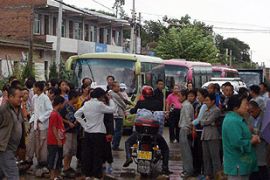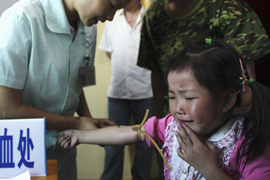Two held in China lead poison case
Factory officials detained after more than 1,350 children suffer lead poisoning.

According to Xinhua, local authorities shut down the processing plant last week and detained two of its executives on suspicion of “causing severe environment pollution”.
A primary school, a middle school and a kindergarten were within 500m of the plant.
Fears of lead poisoning began to spread among villagers in early July when many children became susceptible to colds and suffered fevers and other ailments, Xinhua said.
It is the latest case highlighting the serious environmental problems caused by China’s rapid economic growth.
For decades, many Chinese companies dumped poisons into rivers and the ground rather than disposing them safely, counting on the acquiescence of local governments unwilling to damage their economic lifelines.
Angry protests
| Effects of lead poisoning | ||
Lead poisoning is a medical condition caused by increased levels of the metal lead in the blood.
|
Al Jazeera’s Melissa Chan, reporting from Beijing, said industrial pollution was becoming a “chronic problem” for China.
Even though China has had a greater awareness of the need to be more environmentally conscious, the country is still seeing cases such as these, Chan said.
The authorities were concerned not just about the health effects on people but also the violence that could flare up from such cases and affect the social stability that Beijing values so highly.
Earlier this week, hundreds of villagers whose children were affected by the leaching of lead from a local smelter stormed the Dongling Lead and Zinc Smelting plant in Changqing town.
The villagers also tore down fences and blocked traffic outside the factory in protest.
About 80 per cent of the children in two villages near the plant had tested positive for lead poisoning, some of them with lead levels 10 times the level considered safe in China.
A senior city official later apologised for the incident and the authorities shut down the factory on Tuesday citing safety reasons.
Contamination
Lead poisoning can damage the nervous and reproductive systems and cause high blood pressure, anaemia and memory loss.
It is especially harmful to young children, pregnant women and foetuses, and the damage is usually irreversible, according to the World Health Organisation.
 |
| More than 1,350 children have tested positive for excessive lead in their blood [AFP] |
Following the outrage, the authorities promised to relocate hundreds of families within two years with the building of new homes about 5km from the plant starting last week, but residents were not reassured.
Deng Xiaoyan, a farmer in Sunjianantou, one of the affected villages, said a recent test showed her three-year-old daughter had high levels of lead.
“If they relocate us to these nearby places, who can guarantee that our babies will be safe?” she said.
She said she thought those houses would still be too close.
“There is lead in the air, the air is polluted, everything is polluted,” she said.
China’s pollution and lax product safety standards have long been a source of tension and unrest, particularly when residents of pollution hotspots – dubbed “cancer villages” because of high disease rates – feel they are being ignored.

 Symptoms include: Excess lethargy, abdominal pain, headache.
Symptoms include: Excess lethargy, abdominal pain, headache.